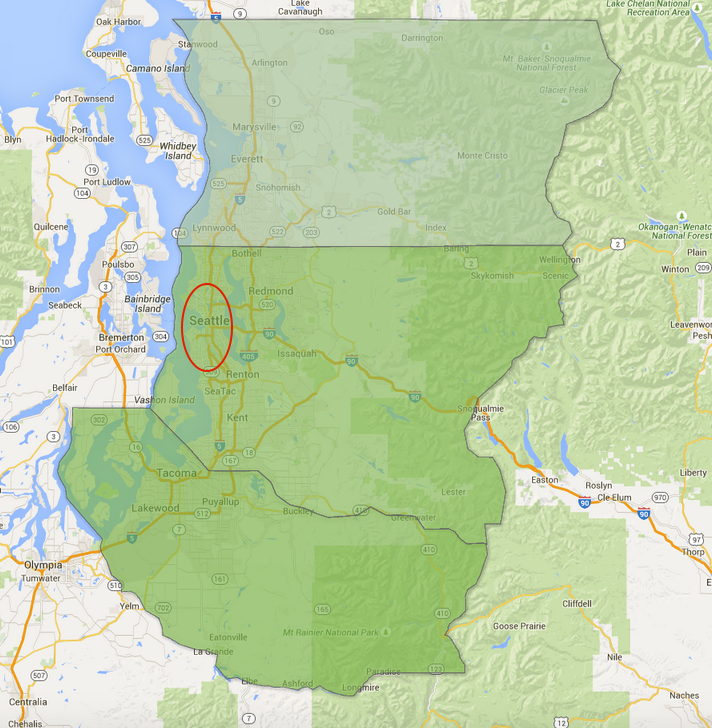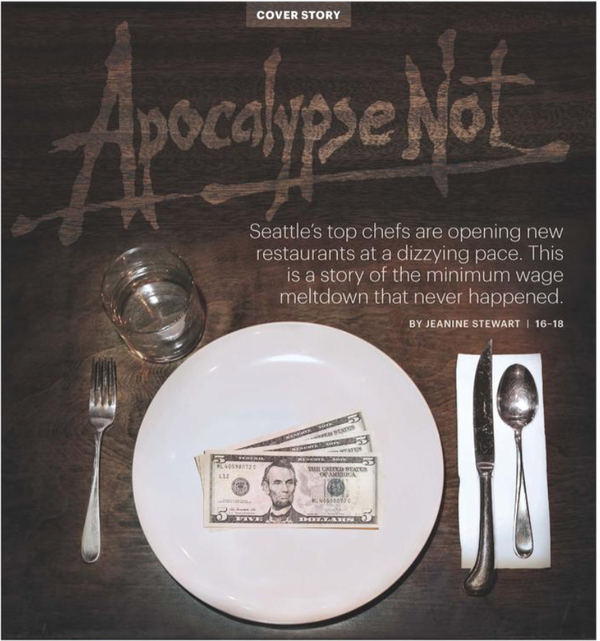@TBPInvictus here.
Conservative Seattle talk show host Dori Monson had the (conservative) Washington Policy Center’s (WPC) Erin Shannon on his show to discuss the city’s minimum wage initiative. Hilarity ensued.
There can be no doubt that Monson hosted Shannon because of this piece that she’d authored several days ago at WPC’s website.
Shannon, sadly, had done nothing more than riff off more useless data misrepresentation from AEI’s Mark Perry. Alas, this is how the right wing echo chamber works – torture some data until they say what you want, run with that, have others pick up on it. Lather. Rinse. Repeat.
Shannon makes the following false claim:
Since implementing the $15 minimum wage law this year, the city of Seattle has lost 700 restaurant jobs (as of September).
It seems that, like Professor Perry, geography is not Ms. Shannon’s strong suit, either.
Perry continues to reference the “Seattle area” or the “Seattle MSA.” So, by way of recap: The Seattle-Tacoma-Bellevue Metropolitan Statistical Area (MSA) is comprised of three counties – King, Snohomish, and Pierce. It is, in a word, huge.
The Seattle-Tacoma-Bellevue MSA covers 5,872 square miles. The city of Seattle covers 84. The MSA is 70 times the size of the city. The Seattle-Tacoma-Bellevue MSA has a population of about 3,700,000. The city of Seattle has a population of about 660,000. The MSA’s population is some 5 times that of the city. Think for a moment about the size of the MSA versus the size of the city – both geographically and in population. Finally, keep foremost in your mind that the minimum wage ordinance was passed only in the city proper. And yet, despite this, Perry and his lackeys continue to abuse and misrepresent the data, drawing inferences where there are none to be drawn. It’s about as intellectually dishonest an exercise as I’ve seen in many years, and I’d beg them to stop if I thought it’d make a shred of difference.
Because the visual is so striking, here (again) is the Seattle-Tacoma-Bellevue MSA and, within it, the city of Seattle. Dori, please spend a few minutes discussing how your guests divine information about the city of Seattle from the geographic area below, some 70 times its size. Thanks.
If you can look at that graphic and tell me that something happening in, say, Darrington or Oso should be considered when assessing Seattle’s minimum wage, well, we’ve got a disagreement on our hands.
In the meantime, in the real world, reporting on what’s actually going on in the city produces cover stories like this one, in the Puget Sound Business Journal:
I have no expectation that Perry will stop dishonestly conflating the city with its MSA. But the record should be set straight. Each and every time this nonsense rears its ugly head.
See you again soon on this!




If there were anything to the narrative that increased minimum wage drive businesses to relocate then it would be that they relocate a few miles to retain their customers but avoid the pay raises. So if the larger area is losing jobs it is certainly not because of Seattle wages.
However, the right wing does not let facts get in the way of their narratives. Mostly because their audience is not scientifically trained people but low info morons who uncritically will drink the cool aid as long as its not red.
Just a thought with no numbers to back it or refute it:
Might the job loss in the MSA have anything to do with the corporate fortunes and policies of Boeing?
And then might it not be more closely correlated with the “Freedom Caucus”‘s temper tantrum holding back new government contracts? I would imagine that has a bigger effect on employment than the price of a latte.
As for GOP primary debates: only like [conservatives] thinkers should be allowed to question snake oil sellers.
“If there were anything to the narrative that increased minimum wage drive businesses to relocate then it would be that they relocate a few miles to retain their customers but avoid the pay raises.”
Yes, but a business would risk not being able to attract a similar caliber of employee at a lower wage So maybe the remainder of the MSA should raise the minimum wage to attract these prospective employees?
.
That would presume that there were plenty of jobs in the higher minimum wage area – this particular narrative presumes the opposite (large losses of jobs due to higher wages).
In the real world you are probably correct that there would be a bit of a spill over effect in the near vicinity of the minimum wage area. It will likely play out as both a certain “quality gradient” for employees, and as a need to increase wages above the legal minimum (similar to normal competition for labor when the supply is low).
Not enough time has passed to draw a conclusion on the minimum wage hike. During a recovery, the data is masked. However, economics is about the marginal effects and some people say that using Chipotle is not a valid example either. The data should be judged on smaller Mom and Pop restaurants, not chains. Once we have been through a full business cycle, the data will be clearer.
“Increasing the minimum wage increases employment because consumption is increased disproportionately – minimum wage workers spend virtually all of their increased earnings while the business owners paying those higher wages, having higher incomes, save more of theirs or pay down debt. Raising the minimum wage increases the demand level of the community by redistributing income downward and thereby increasing consumption.
Obviously, if minimum wages were eliminated tomorrow, consumer demand would fall immediately and layoffs would ensue everywhere because minimum wage workers would have much less to spend.
Of course Anti-Keynesians have always argued – since FDR established the minimum wage and unemployment benefits 75 years ago – that increasing those benefits or wages destroys jobs because employers can no longer afford to pay their employees the higher wages. They simply ignore the fact that the number of private sector jobs in our economy has more than quadrupled since then. How is that possible? They have no answer.” Economics: Simple and Obvious, 2nd. Ed., pp. 109-110.
Agreed DeDude. I’ve always held that the “genius” for lack of a better word, of the pro-business, anti-work force Republican one tenth of one per centers is convincing the white, lower middle class and minimally educated things like deregulating businesses and doing away with worker and consumer protections is good for them. The Tea Party wouldn’t exist without the Koch Brothers underwriting it. It’s no accident that the gap between the rich and the poor started to widen drastically during the ascension of the “Reagan Revolution.” and continued through Bush, the New Southern Democrat ascension lead by Clinton and the neo con movement of “W” and Obama relying on the economic advice of the same crowd that advised his two predecessors.
It amazes me when I see on TV crowds of lower to working class whites at Republican rallies railing against “entitlements.” I wish them luck in their dotage if these “entitlements” are eliminated. I’m amazed that the wealthy have convinced them that getting rid of Medicaid, food stamps and welfare would enrich their quality of their lives when they are middle aged to elderly and without an income (outside of a paltry social security check) or benefits one gets from an employer.
I used to laugh at every rusted out piece of shit Dodge Aries or K car in the early 1990s that still had REAGAB BUSH bumper stickers!
Aspirations trump reality for these poor suckers voting against their own interests.
One born every minute . . .
I expect nothing less than intellectually dishonest nonsense from Perry; what’s tragic is that the press still treats the AEI as a legitimate think tank.
VennData’s Law of Economics: All minimum wage arguments must include how much DC “think tanks” payoff sellouts to spew invective and the multiplier of these pencil necks spending all their I’ll gotten gains…
Axiom: … plus the Fox News and GOP Media Machine ad revenue that Rupert Murdoch buys is NYC condo with.
Invictus is a Great American.
Washington State has long had a relatively high minimum wage, and it hasn’t hurt the state’s growth. Idaho, in contrast has a much lower minimum wage, so there is a natural experiment being performed along the Washington-Idaho border. The border, by the way, is hundreds of miles east of Seattle and runs mainly through a relatively rural area.
An article from back in 2007 notes that the higher Washington minimum wage lured labor across the border, but, if anything, it helped business on the higher wage side:
http://www.nytimes.com/2007/01/11/us/11minimum.html
For a similar, but more recent article, on the Oregon-Idaho border:
http://www.nytimes.com/2014/02/16/us/crossing-borders-and-changing-lives-lured-by-higher-state-minimum-wages.html